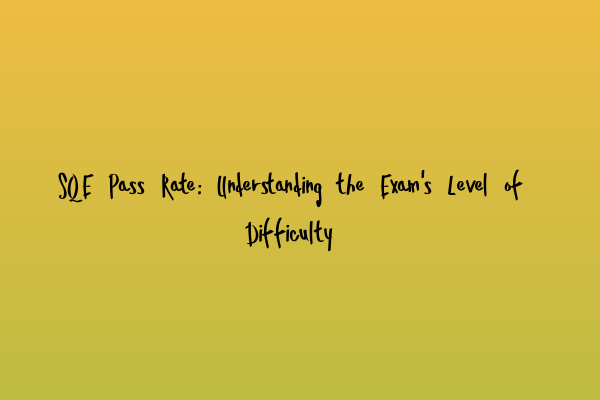SQE Pass Rate: Understanding the Exam’s Level of Difficulty
Aspiring solicitors often wonder about the pass rate for the Solicitors Qualifying Exam (SQE). Understanding the difficulty level of the exam is crucial when preparing for it. In this blog post, we will delve into the factors that determine the pass rate and provide insights into why the SQE is considered a challenging examination.
The Role of the Solicitors Qualifying Exam (SQE)
The SQE is a two-part examination that assesses the competence of individuals seeking qualification as solicitors in England and Wales. It was introduced by the Solicitors Regulation Authority (SRA) to replace the previous Legal Practice Course (LPC) and provide a standardized assessment for all prospective solicitors.
The first part of the SQE focuses on practical legal skills, while the second part tests candidates’ legal knowledge and understanding. These exams cover a wide range of legal topics, ensuring that candidates have a comprehensive understanding of the law.
Understanding the Pass Rate
The pass rate refers to the percentage of candidates who successfully pass an examination. For the SQE, the pass rate is an important metric that indicates the overall difficulty level of the exam. However, it is essential to note that the pass rate can be influenced by various factors and should not be the sole determining factor when gauging the exam’s difficulty.
Factors Influencing the Pass Rate
Several factors contribute to the SQE’s pass rate:
- Exam Format: The SQE’s format is significantly different from its predecessor, the LPC. The change in format and structure can impact the pass rate, as candidates need to adjust their preparation strategies to suit the new exam requirements.
- Preparation Resources: As the SQE is a new examination, the availability and quality of preparation resources can affect the pass rate. Candidates who have access to comprehensive study materials, practice questions, and structured revision courses are more likely to perform well in the exam.
- Candidate Backgrounds: The diversity of candidate backgrounds can also influence the pass rate. Individuals with prior legal experience or a strong academic background may have an advantage over those without such qualifications. However, the SQE aims to assess the competence of candidates regardless of their background.
- Exam Difficulty: The difficulty level of the SQE itself plays a significant role in determining the pass rate. As the examination aims to test candidates comprehensively, it is designed to be challenging. The SQE covers a wide range of legal topics, requiring candidates to demonstrate both knowledge and practical skills.
Why is the SQE Considered Challenging?
The SQE is considered a challenging examination due to several reasons:
- Breadth of Content: The SQE covers a wide array of legal topics, ensuring that candidates have a comprehensive understanding of the law. This requires extensive knowledge and the ability to apply legal principles in various contexts.
- Practical Skills Assessment: The SQE places a strong emphasis on the assessment of practical legal skills. Candidates are required to demonstrate their ability to analyze legal problems, draft legal documents, and communicate effectively. This practical aspect adds an extra layer of complexity to the examination.
- Time Constraint: The SQE is a time-constrained examination, requiring candidates to answer questions within a given timeframe. This puts additional pressure on candidates to manage their time effectively and perform under strict time constraints.
Conclusion
The pass rate of the SQE is influenced by various factors such as the exam format, available resources, candidate backgrounds, and the difficulty level of the examination. While the pass rate is a relevant metric, aspiring solicitors should focus on developing a comprehensive understanding of the law, practicing practical legal skills, and utilizing appropriate study resources to increase their chances of success in the SQE.
At SQE Exam Law, we understand the challenges faced by aspiring solicitors in preparing for the SQE. Our comprehensive study materials and expert guidance can help you navigate the examination successfully. Contact us today to kickstart your journey towards becoming a qualified solicitor!

Leave a Reply